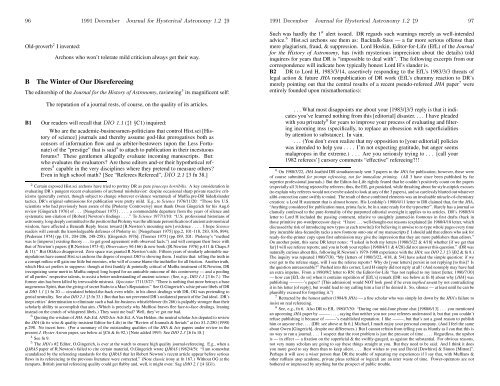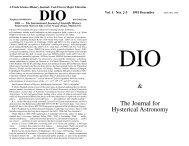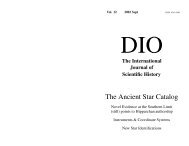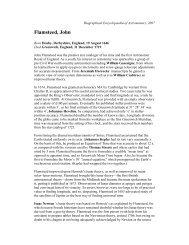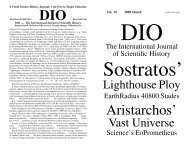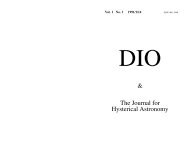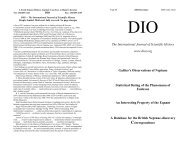DIO 1.2 - DIO, The International Journal of Scientific History
DIO 1.2 - DIO, The International Journal of Scientific History
DIO 1.2 - DIO, The International Journal of Scientific History
You also want an ePaper? Increase the reach of your titles
YUMPU automatically turns print PDFs into web optimized ePapers that Google loves.
96 1991 December <strong>Journal</strong> for Hysterical Astronomy <strong>1.2</strong> ‡9<br />
Old-proverb 2 I invented:<br />
B<br />
Archons who won’t tolerate mild criticism always get their way.<br />
<strong>The</strong> Winter <strong>of</strong> Our Disrefereeing<br />
<strong>The</strong> editorship <strong>of</strong> the <strong>Journal</strong> for the <strong>History</strong> <strong>of</strong> Astronomy, raviewing 3 its magnificent self:<br />
B1<br />
<strong>The</strong> reputation <strong>of</strong> a journal rests, <strong>of</strong> course, on the quality <strong>of</strong> its articles.<br />
Our readers will recall that <strong>DIO</strong> 1.1 (‡1 §C1) inquired:<br />
Who are the academic-businessmen-politicians that control Hist.sci [<strong>History</strong><br />
<strong>of</strong> science] journals and thereby assume god-like prerogatives both as<br />
censors <strong>of</strong> information flow and as arbiter-bestowers (upon the Less Fortunate)<br />
<strong>of</strong> the “prestige” that is said 4 to attach to publication in their incestuous<br />
forums? <strong>The</strong>se gentlemen allegedly evaluate incoming manuscripts. But:<br />
who evaluates the evaluators? Are these editors and-or their hypothetical referees<br />
5 capable in the very disciplines where they pretend to measure others?<br />
Even in high school math? [See “Referees Refereed”, <strong>DIO</strong> 2.1 ‡3 fn 38.]<br />
2 Certain exposed Hist.sci archons have tried to portray DR as pure praeceps horribilis. A key consideration in<br />
evaluating DR’s pungent recent evaluations <strong>of</strong> archonal misbehavior: despite occasional sharp private reactive criticisms<br />
(generally correct, though subject to change wherever evidence warranted) <strong>of</strong> Muffia pre-DR hide&slander<br />
tactics, DR’s original submissions for publication were pretty mild. E.g., to Science 1976/11/20: “Those few U.S.<br />
scientists who had previously been aware <strong>of</strong> the [Ptolemy Controversy] must thank Owen Gingerich for his Aug.6<br />
review [Gingerich 1976] <strong>of</strong> . . . [Neugebauer 1975] . . . . a commendable departure from the years <strong>of</strong> silence and<br />
systematic non-citation <strong>of</strong> [Robert] Newton’s findings . . . .” To Science 1977/1/10: “U.S. pr<strong>of</strong>essional historians <strong>of</strong><br />
astronomy, long deeply committed to the position that Ptolemy was the ultimate personification <strong>of</strong> ancient astronomical<br />
wisdom, have affected a Beneath Reply freeze toward [R.Newton’s mounting new] evidence . . . . I hope Science<br />
readers will consult the knowledgeable defenses <strong>of</strong> Ptolemy in: [Neugebauer 1975] (pp.2, 101-118, 283, 836, 894);<br />
[Pedersen 1974] (pp.131, 204-206, 248-258); [Gingerich 1976]; [Toomer 1975] (pp.189, 201: Ptolemy’s “method<br />
was to [improve] existing theory . . . to get good agreement with observed facts.”) and will compare their force with<br />
that <strong>of</strong> Newton’s papers ([R.Newton 1973-4]; Observatory 96:166) & new book ([R.Newton 1976] p.411 & Chaps.5<br />
& 11).” But OG&co disapproved. Zero space was granted R.Newton’s side. Fifteen years <strong>of</strong> similarly admirable manipulations<br />
have earned Hist.sci archons the degree <strong>of</strong> respect <strong>DIO</strong> is showing them. I realize that: telling the truth in<br />
a corrupt milieu will gain one little but enemies, who will <strong>of</strong> course blame the truthteller for all friction. Another truth,<br />
which Hist.sci prefers to suppress: though at first frankly & pointedly critical <strong>of</strong> Muffia treatment <strong>of</strong> R.Newton, DR<br />
(recognizing some merit in Muffia output) long hoped for an amicable outcome <strong>of</strong> this controversy — and a pooling<br />
<strong>of</strong> all parties’ respective talents, to assist a better understanding <strong>of</strong> ancient science. (See, e.g., <strong>DIO</strong> 1.1 ‡3 fn 7.) <strong>The</strong><br />
former aim has been killed by irrevocable mistrust. (Spectator 1711/3/27: “<strong>The</strong>re is nothing that more betrays a base<br />
ungenerous Spirit, than the giving <strong>of</strong> secret Stabs to a Man’s Reputation.” See O.Gingerich’s schiz private libels <strong>of</strong> DR<br />
at <strong>DIO</strong> 1.1 ‡1 fn 20 — circulated behind-the-back even while, in his direct dealings with DR, OG was pretending to<br />
genial neutrality. See also <strong>DIO</strong> 2.1 ‡3 fn 33.) But that has not prevented DR’s unilateral pursuit <strong>of</strong> the 2nd ideal. DR’s<br />
inept critics’ determination to eliminate such a bad-for-business whistleblower (fn 266) is palpably stronger than their<br />
scholarly ability to accomplish that aim. (Which is precisely why Muffiosi braves flee face-to-face dealings, leaning<br />
instead on the crutch <strong>of</strong> whispered libels.) <strong>The</strong>y want me bad? Well, they’ve got me bad.<br />
3 Quoting the wisdom <strong>of</strong> JHA Adv.Ed. AND Isis Adv.Ed. A.Van Helden, the neutral scholar Isis deputed to review<br />
the JHA (& its wise & quality-insistent Editor-for-Life) in the “Review <strong>of</strong> <strong>Journal</strong>s & Serials” at Isis 8<strong>1.2</strong>:280 (1990)<br />
p.298. No incest here. (For a summary <strong>of</strong> the outstanding qualities <strong>of</strong> the JHA & Isis papers under review in the<br />
present J. Hyster Astron paper, see below at §C6 & fn 92.) [Note added 1993: See <strong>DIO</strong> 2.3 ‡6 fn 18.]<br />
4 See fn 9.<br />
5 <strong>The</strong> JHA’s #2 Editor, O.Gingerich, is ever at the watch to ensure high quality journal-refereeing. E.g., when a<br />
QJRAS paper <strong>of</strong> R.Newton’s failed to cite certain material, O.Gingerich wrote QJRAS (1982/4/5): “I am somewhat<br />
scandalized by the refereeing standards for the QJRAS that let Robert Newton’s recent article appear before serious<br />
flaws in its referencing to the previous literature were corrected.” (Note classic irony at fn 167.) Without OG at the<br />
ramparts, British journal refereeing quality could get flabby and, well, it might even: Sag (<strong>DIO</strong> 2.1 ‡4 §G1).<br />
1991 December <strong>Journal</strong> for Hysterical Astronomy <strong>1.2</strong> ‡9 97<br />
Such was hardly the 1 st alert issued. DR regards such warnings merely as well-intended<br />
advice. 6 Hist.sci archons see them as: Backtalk-Sass — a far more serious <strong>of</strong>fense than<br />
mere plagiarism, fraud, & suppression. Lord Hoskin, Editor-for-Life (EfL) <strong>of</strong> the <strong>Journal</strong><br />
for the <strong>History</strong> <strong>of</strong> Astronomy, has (with mysterious imprecision about the details) told<br />
inquirers for years that DR is “impossible to deal with”. <strong>The</strong> following excerpts from our<br />
correspondence will indicate how typically honest Lord H’s slander is.<br />
B2 DR to Lord H, 1983/3/14, assertively responding to the EfL’s 1983/3/3 threats <strong>of</strong><br />
legal action & future JHA nonpublication <strong>of</strong> DR work (EfL’s chummy reaction to DR’s<br />
merely pointing out that the central results <strong>of</strong> a recent pseudo-refereed JHA paper 7 were<br />
entirely founded upon mismathematics):<br />
. . . What most disappoints me about your [1983/]3/3 reply is that it indicates<br />
you’ve learned nothing from this [editorial] disaster. . . . I have pleaded<br />
with you privately 8 for years to improve your process <strong>of</strong> evaluating and filtering<br />
incoming mss (specifically, to replace an obsession with superficialities<br />
by attention to substance). In vain.<br />
. . . (You don’t even realize that my opposition to [your editorial] policies<br />
was intended to help you . . . . I’m not expecting gratitude, but anger seems<br />
malapropos in the extreme.) . . . Are you seriously trying to . . . [call your<br />
1982 referees’] cursory comments “effective” refereeing?!!<br />
6 On 1980/3/22, JHA-loathéd DR simultaneously sent 3 papers to the JHA for publication; however, these were<br />
<strong>of</strong> course submitted for prompt refereeing, not for immediate printing. (All 3 have since been published by far<br />
superior pr<strong>of</strong>essional journals.) But the Editor-for-Life rightly feared that he couldn’t positively count on the papers<br />
(especially all 3) being rejected by referees; thus, the EfL got panicked, while thrashing about for style-nitpick excuses<br />
(to explain why referees would not even be asked to look at any <strong>of</strong> the 3 papers), and so carelessly blurted out whatever<br />
alibi-concoction came swiftly to mind. <strong>The</strong> result <strong>of</strong> these combined elements was an invaluable miracle-<strong>of</strong>-chemistry<br />
creation: a Lord H statement that is almost honest. His Lordship’s 1980/4/11 letter to DR claimed that, for the JHA,<br />
“Anything considered for publication must, prima facie, be in a state ready for the typesetter”. Rarely has a journal so<br />
clumsily confessed to the pure-formality <strong>of</strong> the purported editorial oversight it applies to its articles. DR’s 1980/5/4<br />
letter to Lord H included the passing comment, relative to unsightly jammed-in footnotes in first drafts (back in<br />
those primitive pre-wordprocessor days): “I have . . . well-thought-out reasons (explained [in 1980/4/18 letter, which<br />
discussed the risk <strong>of</strong> introducing new typos at each rewrite]) for believing it unwise to re-type whole pages every time<br />
[my incurable idea-fecundity tacks a new footnote onto one <strong>of</strong> my manuscripts]! I should add that editors who ask for<br />
ready-for-the-printer copy upon first submission may give the impression that they are more publishers than editors.”<br />
On another point, this same DR letter notes: “I asked in both my letters [1980/3/22 & 4/18] whether [if we get that<br />
far] I will see referee reports; and you in both your replies [1980/4/11 & 4/28] did not answer this question.” (DR was<br />
naturally curious about this, following R.Newton’s 1979-1980 experience with the JHA: see <strong>DIO</strong> 2.1 ‡3 §B2 & fn 8.)<br />
<strong>The</strong> inquiry was repeated 1980/7/30, “My [letters <strong>of</strong> 1980/3/22, 4/18, & 5/4] have asked the simple question: if we<br />
ever get to the referee stage, will I see the referee reports? Why do [your letters] persist in not replying [to this]? Is<br />
the question unreasonable?” Pushed into this corner, Lord H simply did not reply at all! (And nonreply may have had<br />
an extra impetus. From a 1980/9/2 letter to RN: the Editor-for-Life “has not replied to my latest [letter, 1980/7/30]<br />
— how can [EfL do so] when it contains repetition <strong>of</strong> [EfL’s] remark [DR: see below at fn 8] about why [JHA] was<br />
publishing ———-’s paper? [This admission] would NOT look good if he even implied assent by not contradicting<br />
it in his letter [<strong>of</strong> reply], but would lead to my calling him a liar if he denied it. So, silence — at least until he can be<br />
plausibly excused for forgetting it.”)<br />
7 Retracted by the honest author (1984/6 JHA) — a fine scholar who was simply let down by the JHA’s failure to<br />
insist on real refereeing.<br />
8 See, e.g., fn 6. Also DR to EfL 1980/7/30: “During our mid-June phone chat [1980/6/13] . . . you mentioned<br />
an upcoming JHA paper by ——– . . . , saying that neither you nor your referees understood it, but that you couldn’t<br />
refuse publishing it because <strong>of</strong> ——–’s established reputation. I like ——–, but that’s not a good reason to publish<br />
him or anyone else. . . . [DR: see above at fn 6.] Michael, I much enjoy your personal company. (And I feel the same<br />
about Owen [Gingerich], despite our differences.) But I cannot refrain from telling you as bluntly as I can that this is<br />
no way to run a journal. . . . I suspect that the root problem is just the pressure <strong>of</strong> time . . . . Regardless, the upshot<br />
is — in effect — a fixation on the superficial & the swiftly-gauged, as against the substantial. For obvious reasons,<br />
not very many scholars are going to say these things straight at you. But they need to be said. And I think it does<br />
you more good to say them than to keep silent. . . . Best wishes to you and David [Dewhirst] & Simon [Mitton]”.<br />
Perhaps it will save a wiser person than DR the trouble <strong>of</strong> repeating my experiences if I say that, with Muffians &<br />
other ruffians atop academe, private pleas (ethical or logical) are an utter waste <strong>of</strong> time. Power-operators are not<br />
bothered or impressed by anything but the prospect <strong>of</strong> public trouble.


